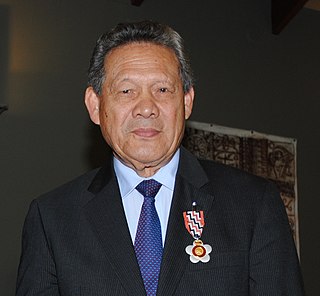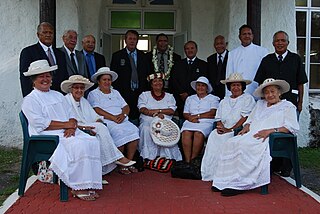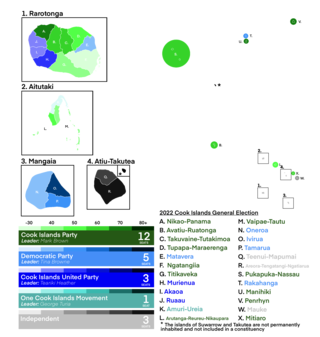
The Cook Islands Party is a nationalist political party in the Cook Islands. It was the first political party founded in the Cook Islands, and one of the two major parties of the islands' politics since 1965.

Joseph Williams was a Cook Islands politician and physician who served as Prime Minister of the Cook Islands for four months in 1999. He is credited with having worked to prevent the spread of the tropical disease lymphatic filariasis (elephantiasis). He principally resided in Auckland, New Zealand, where he was medical director of the Mt Wellington Integrated Family Health Centre.

Albert Royle Henry was the first Premier of the Cook Islands and the founder and first leader of the Cook Islands Party (CIP). First elected Premier in August 1965, he was unseated in the aftermath of the 1978 election after an electoral petition found he had committed electoral fraud. He was later stripped of his knighthood. In 2023 he was posthumously pardoned.

The House of Ariki is a parliamentary body in the Cook Islands. It is composed of Cook Islands high chiefs (ariki), appointed by the King's Representative. While it functions in a similar way to the House of Lords and the Senate of Canada, the country's parliament is officially unicameral. There are up to twenty-four members, representing different islands of the Cooks.
Norman George is a Cook Islands politician and former Speaker of the Cook Islands Parliament, Deputy Prime Minister, and Cabinet Minister.

General elections were held in the Cook Islands in January 1989 to elect 24 MPs to the Parliament. The elections saw the Cook Islands Party win 12 seats, the Democratic Tumu Party win 2 seats, and the Democratic Party-led opposition coalition win 9 seats. One seat was won by an independent. Following the elections, the Democratic Tumu Party supported the CIP, and Geoffrey Henry became Prime Minister for the second time.

General elections were held in the Cook Islands on 30 March 1983. The result was a victory for the Cook Islands Party (CIP) of Geoffrey Henry, who became prime minister. However, the CIP lost their majority by the end of July, eventually resulting in Parliament being dissolved and new elections called in November 1983.

General elections were held in the Cook Islands on 2 November 1983. The result was a victory for the Democratic Party, which won 13 of the 24 seats. A coalition government was formed with the opposition Cook Islands Party, with Democratic Party leader Thomas Davis as prime minister and CIP leader Geoffrey Henry as deputy prime minister. Henry was later replaced with Terepai Maoate.

General elections were held in the Cook Islands on 20 April 1965 to elect 22 MPs to the Cook Islands Legislative Assembly. The elections were won by the Cook Islands Party and saw Albert Henry become the Cook Islands' first Premier.

General elections were held in the Cook Islands on 1 May 1968. The result was a victory for the Cook Islands Party (CIP), which won 16 seats, a gain of two from the 1965 elections. The newly formed United Cook Islanders won the other six seats to become the parliamentary opposition. CIP leader Albert Henry continued as Prime Minister.

General elections were held in the Cook Islands on 11 April 1972. The result was a victory for the ruling Cook Islands Party (CIP), which won 15 of the 22 seats in the Legislative Assembly. The newly formed Democratic Party won seven seats. CIP leader Albert Henry remained Premier.

Early general elections were held in the Cook Islands on 3 December 1974. The result was a victory for the ruling Cook Islands Party (CIP), which won 14 of the 22 seats in the Legislative Assembly with 64% of the vote. The Democratic Party won the remaining eight seats. CIP leader Albert Henry remained Premier.

General elections were held in the Cook Islands on 9 July 2014, determining the membership of the 16th Cook Islands Parliament.
Te-Hani Rose Alexandra Brown is a Cook Islands politician and member of the Cook Islands Parliament. She is an independent.

Dick Charles Brown was a Cook Islands businessman and politician. He served as a member of the Legislative Assembly between 1958 and 1965, and became the territory's first Leader of Government Business in 1963.

Ngatupuna Matepi (1909–1977) was a Cook Islands politician. He served as a member of the Legislative Assembly from 1958 until his death, had two spells in the cabinet between 1962 and 1965, and became the first official Leader of the Opposition in 1968.
Papa Raui Pokoati was a Cook Islands politician. He served as a member of the Legislative Assembly for his home island of Mitiaro between 1965 and 1978.
Wesley Kareroa is a Cook Islands politician and member of the Cook Islands Parliament. He is a member of the Cook Islands Democratic Party.
The Overseas seat was a Cook Islands electoral division returning one member to the Cook Islands Parliament. It was abolished in 2003.

General elections were held in the Cook Islands on 1 August 2022. A referendum on legalising medical cannabis was held on the same day.









